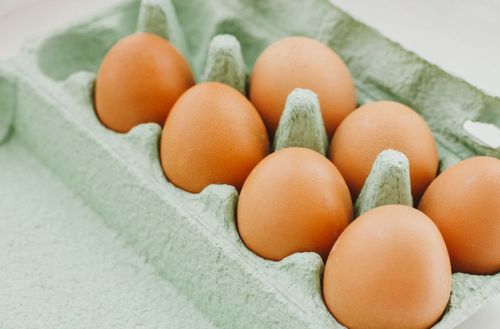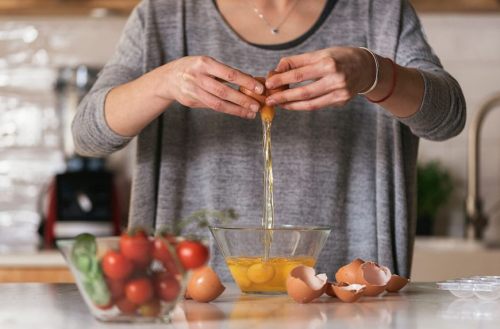Every busy girl knows that eggs are one of the easiest and most versatile foods to cook. You can poach them, fry them, or boil them in less time than it takes for a face mask to set—and they’re just as delicious for breakfast as they are for a late dinner. Plus, when it comes to nutrition, they’re a total protein powerhouse. Shopping for them, however? That part’s a little more challenging.
Suddenly, it seems like there are a slew of different colors and types of eggs, each one claiming to be a better-for-you and more responsible than the rest. For example, many grocers may have you thinking that their brown—and pricier!—eggs are the more ‘natural’ choice, when they’re actually no different than their white counterparts. “Egg color is determined entirely by the breed of bird, not by what they eat or how healthy the animals were,” says Daisy Freund, the ASPCA‘s director of farm animal welfare strategy and campaigns.
The best way to suss out the actual good eggs: Ensure that they come from humanely and responsibly raised hens who were fed a healthy diet. This is easier said than done, however. “The truth of the matter is that the average consumer probably has no clue as to where their eggs came from,” says Freund. Many egg suppliers label their cartons with tons of buzzwords to stand out from the rest, and much of this terminology can be shell-shockingly deceptive.
To help you decipher what egg labels really mean, we asked Freund to walk us through some of the most common certifications and phrases you’ll see on the package. Cage-free vs. free range? At last, you’ve got this.
Let’s get cracking! Keep reading for everything you need to know when reading egg carton labels.

Natural, No Added Hormones, Vegetarian Fed
These terms carry zero weight and are both unverified and unregulated, says Freund. “Since hormones are legally prohibited for use in chickens, the ‘No Hormones Added’ label is [especially] meaningless,” she adds. In fact, eggs with any of these labels probably come from factory farms that raise hens in unsafe, unsanitary, and overcrowded environments. “This can create health hazards by reducing animals’ immunity and making it easy for disease to spread,” says the expert.
Cage-Free
Although this term may make it seem like hens are free to roam around outside, it’s not always the case. While “cage-free” certification means that hens don’t live in cramped battery cages and are able to spread their wings and move about, it doesn’t necessarily mean that they’re getting much fresh air. “This label does not guarantee adequate space, light, enrichment, or other more humane practices addressed by welfare certifications,” says Freund. (More on these in a minute.)
Free-Range, Free-Roaming
Eggs with these certifications come from hens that are uncaged and have access to outdoors. What makes this label super deceiving, however, is that there really aren’t any regulations on the quality of the area or the amount of time birds spend outdoors. In other words, tons of hens can be crammed into a tiny outdoor space for short periods of time—not exactly living their best lives.
Pastured
This is the term that many health professionals look for when shopping for eggs. Pastured eggs generally come from hens that have been raised with access to tons of outdoor space and have access to a natural diet of bugs and plants. “This can increase the nutrients in the eggs, including higher [levels of] omega-3 fatty acids,” says Freund. When shopping for these eggs, make sure they’re Certified Humane or Animal Welfare Approved, too. “The label ‘pasture-raised’ is unfortunately unregulated and without uniform standards,” she says. If the carton has one of these certifications, you’re all set.

USDA Organic
This certification, which is managed by the USDA’s Natural Organic Program, is one of the more common labels you will find on a carton of eggs. It’s also pretty undefined. While this certification requires hens to be uncaged and fed an organic, all-vegetarian diet, there is no specification of the size or quality of outdoor space that they have access to. “This causes conditions to vary widely between producers, and some large-scale organic producers have begun using concrete, enclosed porches in place of true outdoor access,” says Freund. Look for other certifications for an indication of how humane the farm really is.
Omega-3
All eggs naturally have omega-3 fatty acids, so if a carton touts the content of this nutrient, it’s safe to assume that the hens were given an enriched diet, usually with flaxseed. Sounds like a positive thing, right? Not exactly. “[Omega-3-enriched feed] is not inherently unhealthy for humans, but it is probably a sign that the hens lived indoors, without access to the natural sources of omega-3s, and may even have been in cages,” says Freund.
Certified Humane
The Certified Humane label guarantees that hens are raised cage-free, with enough space to roam around. This may not always mean that they’re raised outside unless the words “free-range” or “pasture” also appear on the package. “These terms mean that the farm is adhering to defined outdoor standards,” says Freund.
This label is not to be confused with American Humane Certified. “This label permits the use of larger cages and does not require any access to the outdoors unless eggs are also labelled with free-range or pasture,” Freund says.
Animal Welfare Approved
Instead of keeping hens all crowded up indoors, the Animal Welfare Approved label means that they’re raised with access to pasture—as mentioned before, it’s a good sign that a carton of so-called pasture-raised eggs is actually legit, in the absence of regulations for the term “pastured.” “It’s also the only program that forbids beak trimming, a common practice to prevent birds from pecking at each other,” Freund says. That’s reason enough to seek out this phrase on the carton, no?
Suffering from egg burnout? Check out these out-of-the-box (carton?) recipes for blue eggs and hash and eggy muffins with kefir butter.
Sign Up for Our Daily Newsletter
Get all the latest in wellness, trends, food, fitness, beauty, and more delivered right to your inbox.
Got it, you've been added to our email list.











